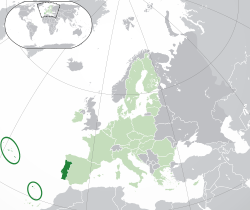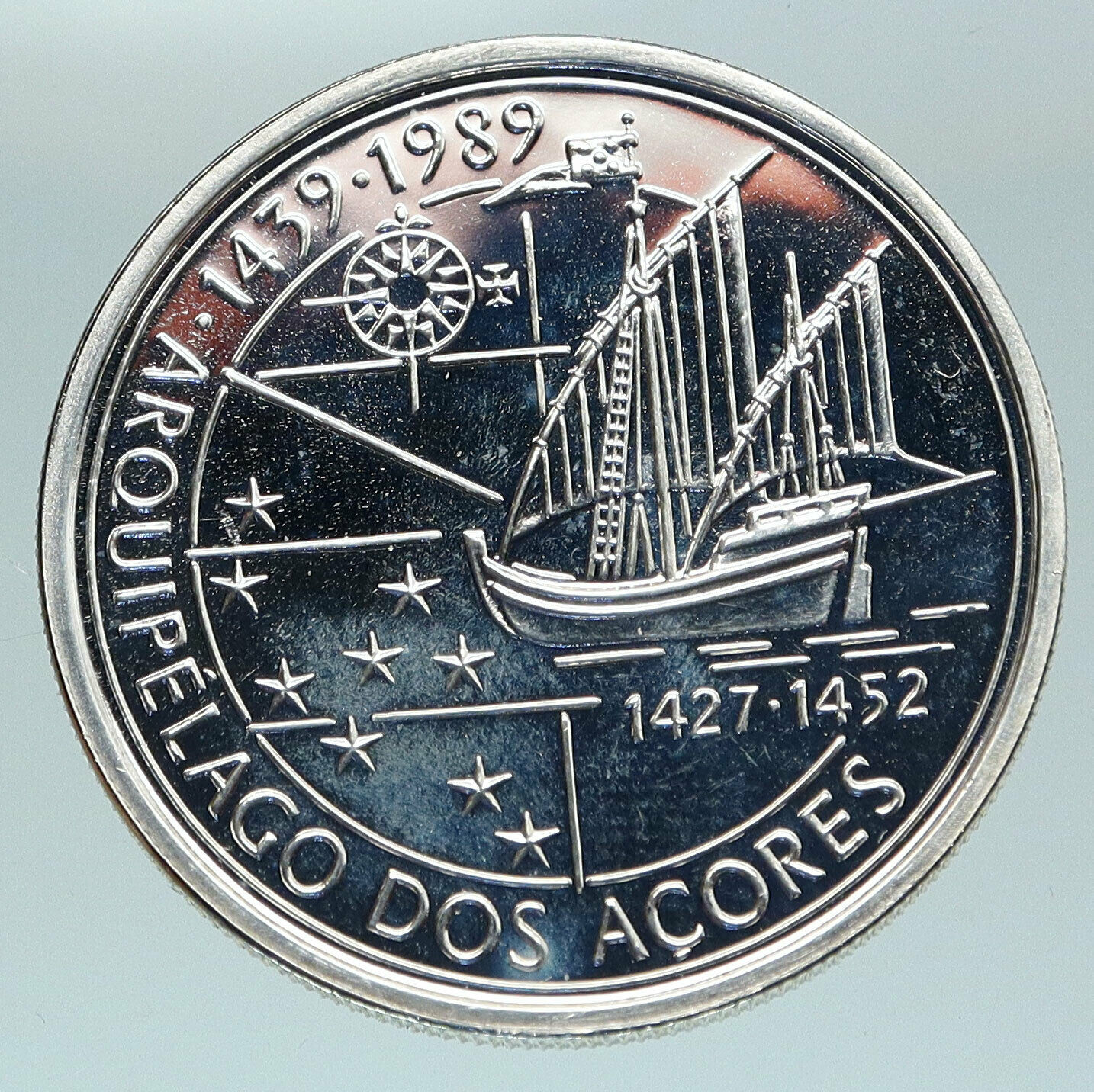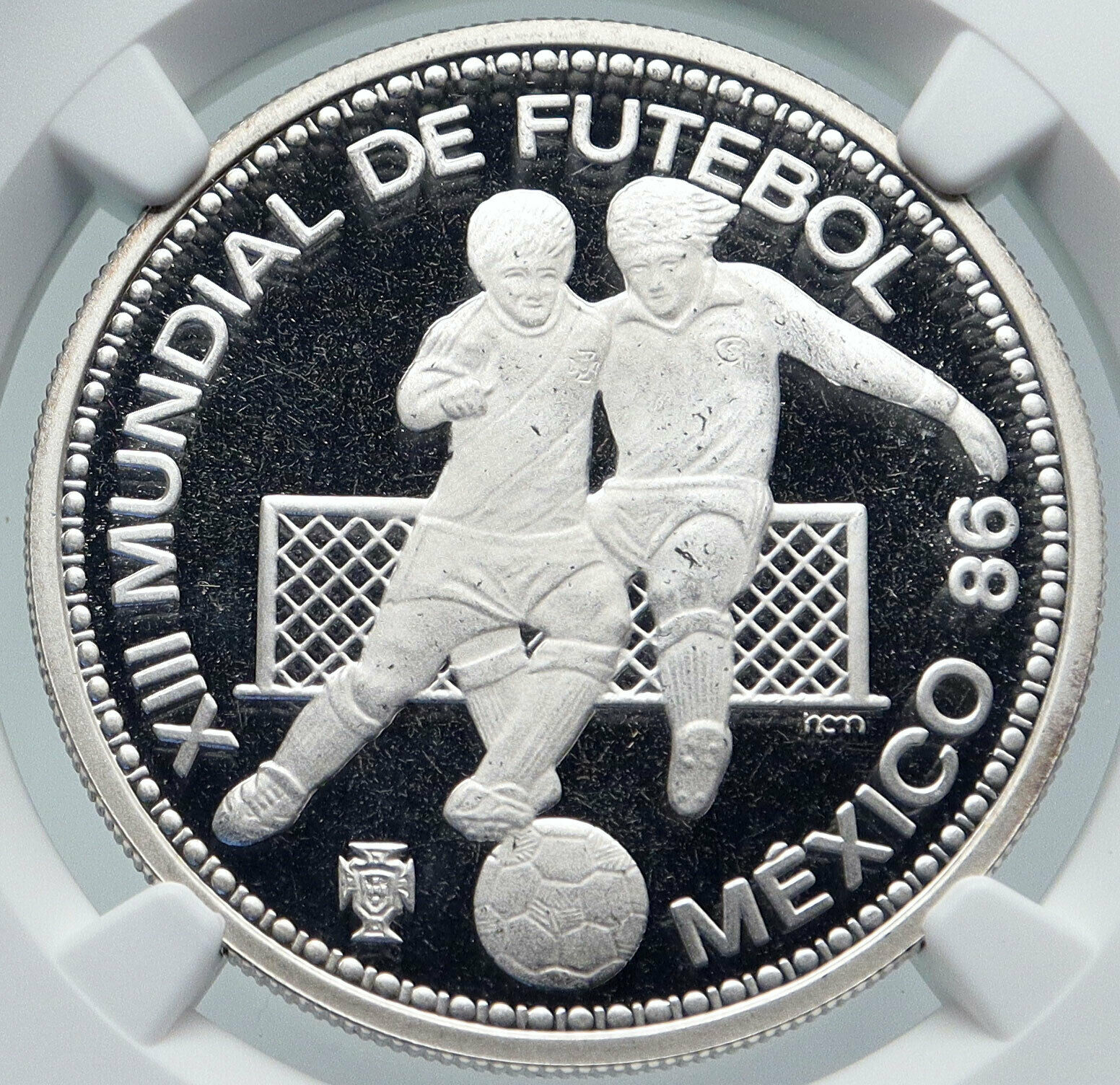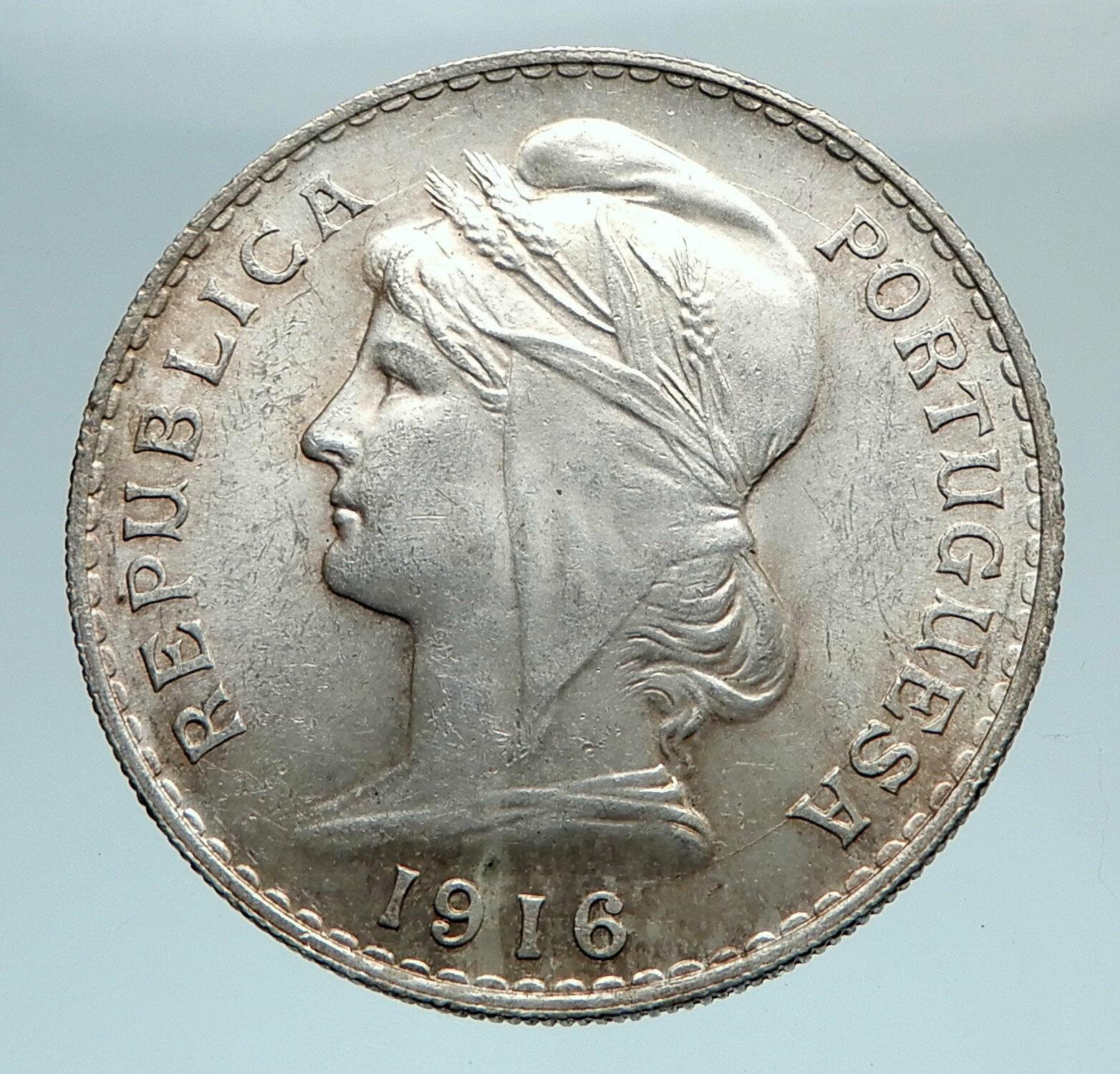|
Portugal under Manuel II: King of Portugal – 1 February 1908 –
5 October 1910
1908 Silver
500 Reis 30mm (12.50 grams) 0.917 Silver (0.3685 oz. ASW)
Reference: KM# 547, Gomes# E2 04 | Engraver:
Valancio Alves
EMANVEL·II·PORTVG: ET·ALGARB: V.ALVES · 1908 ·,
Manuel facing left.
500 REIS, Crowned shield within sprigs.
You are bidding on the exact item pictured, provided with a Certificate of Authenticity and Lifetime Guarantee of Authenticity.
 Dom Manuel II (15 November 1889 – 2 July 1932), “the Patriot” (Portuguese: “o Patriota”) or “the Unfortunate” (Portuguese: “o Desventurado”), was the last King of Portugal, ascending the throne after the assassination of his father, King Carlos I, and his elder brother, Luís Filipe, the Prince Royal. Before ascending the throne he held the title of Duke of Beja. His reign ended with the dissolution of the monarchy in the 5 October 1910 revolution, and Manuel lived the rest of his life in exile in Twickenham, Middlesex, England. Dom Manuel II (15 November 1889 – 2 July 1932), “the Patriot” (Portuguese: “o Patriota”) or “the Unfortunate” (Portuguese: “o Desventurado”), was the last King of Portugal, ascending the throne after the assassination of his father, King Carlos I, and his elder brother, Luís Filipe, the Prince Royal. Before ascending the throne he held the title of Duke of Beja. His reign ended with the dissolution of the monarchy in the 5 October 1910 revolution, and Manuel lived the rest of his life in exile in Twickenham, Middlesex, England.
His first act was to meet with his Council of State and request the resignation of João Franco, whose policies may have been responsible for the tragedy. He appointed a government of national unity, presided over by Admiral Francisco Joaquim Ferreira do Amaral. This quieted the republicans, but in retrospect was seen as weakness.
He opened the Royal Court Assembly on 6 May 1908 in the presence of national representatives, and affirmed his support of the constitution. The King received general public sympathy, due to the deaths of his father and older brother. He was protected by his mother, Amélia, and sought out the support of the experienced politician José Luciano de Castro. Judging that the intervention of King Carlos was a reason for the events of 1908, he declared that he would reign, but not govern.
 For his part, the new King tried to increase the monarchy’s connection with its subjects. The King visited several areas of the country. His trips included stops in Porto, Braga, Viana do Castelo, Oliveira de Azeméis, Santo Tirso, Vila Nova de Gaia, Aveiro, Guimarães, Coimbra and Barcelos. During these visits, his subjects were captivated by the young king, and he was received warmly. On 23 November he travelled to Espinho in open the Vale do Vouga Railway. On his journeys, he ingratiated himself with the people with his candour and pious character. For his part, the new King tried to increase the monarchy’s connection with its subjects. The King visited several areas of the country. His trips included stops in Porto, Braga, Viana do Castelo, Oliveira de Azeméis, Santo Tirso, Vila Nova de Gaia, Aveiro, Guimarães, Coimbra and Barcelos. During these visits, his subjects were captivated by the young king, and he was received warmly. On 23 November he travelled to Espinho in open the Vale do Vouga Railway. On his journeys, he ingratiated himself with the people with his candour and pious character.
However, he was not popular with republicans. One of them, João Chagas, the anti-monarchist journalist and propagandist of the Republican Party, warned the King of the problems that would develop when he declared:
“…your Highness arrives too young into a very old world…!”
  Portugal, officially the Portuguese Republic (Portuguese: República Portuguesa), is a country on the Iberian Peninsula, in Southwestern Europe. It is the westernmost country of mainland Europe, being bordered by the Atlantic Ocean to the west and south and by Spain to the north and east. The Portugal-Spain border is 1,214 km (754 mi) long and considered the longest uninterrupted border within the European Union. The republic also includes the Atlantic archipelagos of the Azores and Madeira, both autonomous regions with their own regional governments. Portugal, officially the Portuguese Republic (Portuguese: República Portuguesa), is a country on the Iberian Peninsula, in Southwestern Europe. It is the westernmost country of mainland Europe, being bordered by the Atlantic Ocean to the west and south and by Spain to the north and east. The Portugal-Spain border is 1,214 km (754 mi) long and considered the longest uninterrupted border within the European Union. The republic also includes the Atlantic archipelagos of the Azores and Madeira, both autonomous regions with their own regional governments.
 The territory of modern Portugal has been continuously settled, invaded and fought over since prehistoric times. The Pre-Celts, Celts, Phoenicians, Carthaginians and the Romans were followed by the invasions of the Visigothic and the Suebi Germanic peoples, who were themselves later invaded by the Moors. These Muslim peoples were eventually expelled during the Christian Reconquista. Portuguese nationality can be traced back to the creation of the First County of Portugal, in 868. In 1139, Afonso Henriques was proclaimed King of Portugal, thus firmly establishing Portuguese independence, under the Portuguese House of Burgundy. The territory of modern Portugal has been continuously settled, invaded and fought over since prehistoric times. The Pre-Celts, Celts, Phoenicians, Carthaginians and the Romans were followed by the invasions of the Visigothic and the Suebi Germanic peoples, who were themselves later invaded by the Moors. These Muslim peoples were eventually expelled during the Christian Reconquista. Portuguese nationality can be traced back to the creation of the First County of Portugal, in 868. In 1139, Afonso Henriques was proclaimed King of Portugal, thus firmly establishing Portuguese independence, under the Portuguese House of Burgundy.
In the 15th and 16th centuries, under the House of Aviz, which took power following the 1383-85 Crisis, Portugal expanded Western influence and established the first global empire, becoming one of the world’s major economic, political and military powers. During this time, Portuguese explorers pioneered maritime exploration in the Age of Discovery, notably under royal patronage of Prince Henry the Navigator and King João II, with such notable discoveries as Vasco da Gama’s sea route to India (1497-98), Pedro Álvares Cabral’s discovery of Brazil (1500), and Bartolomeu Dias’s reaching of the Cape of Good Hope. Portugal monopolized the spice trade during this time, under royal command of the Casa da Índia, and the Portuguese Empire expanded with military campaigns led in Asia, notably under Afonso de Albuquerque, who was known as the “Caesar of the East”.
The destruction of Lisbon in a 1755 earthquake, the country’s occupation during the Napoleonic Wars, the independence of Brazil (1822), and the Liberal Wars (1828-1834), all left Portugal crippled from war and diminished in its world power. After the 1910 revolution deposed the monarchy, the democratic but unstable Portuguese First Republic was established, later being superseded by the “Estado Novo” right-wing authoritarian regime. Democracy was restored after the Portuguese Colonial War and the Carnation Revolution in 1974. Shortly after, independence was granted to all its colonies and East Timor, with the exception of Macau, which was handed over to China in 1999. This marked the end of the longest-lived European colonial empire, leaving a profound cultural and architectural influence across the globe and a legacy of over 250 million Portuguese speakers today.
Portugal is a developed country with a high-income advanced economy and high living standards. It is the 5th most peaceful country in the world, maintaining a unitary semi-presidential republican form of government. It has the 18th highest Social Progress in the world, putting it ahead of other Western European countries like France, Spain and Italy. It is a member of numerous international organizations, including the United Nations, the European Union, the eurozone, OECD, NATO and the Community of Portuguese Language Countries. Portugal is also known for having decriminalized the usage of all common drugs in 2001, the first country in the world to do so. However, the sale and distribution of these drugs is still illegal in Portugal.
|





 Dom Manuel II (15 November 1889 – 2 July 1932), “the Patriot” (Portuguese: “o Patriota”) or “the Unfortunate” (Portuguese: “o Desventurado”), was the last King of Portugal, ascending the throne after the assassination of his father, King Carlos I, and his elder brother, Luís Filipe, the Prince Royal. Before ascending the throne he held the title of Duke of Beja. His reign ended with the dissolution of the monarchy in the 5 October 1910 revolution, and Manuel lived the rest of his life in exile in Twickenham, Middlesex, England.
Dom Manuel II (15 November 1889 – 2 July 1932), “the Patriot” (Portuguese: “o Patriota”) or “the Unfortunate” (Portuguese: “o Desventurado”), was the last King of Portugal, ascending the throne after the assassination of his father, King Carlos I, and his elder brother, Luís Filipe, the Prince Royal. Before ascending the throne he held the title of Duke of Beja. His reign ended with the dissolution of the monarchy in the 5 October 1910 revolution, and Manuel lived the rest of his life in exile in Twickenham, Middlesex, England.  For his part, the new King tried to increase the monarchy’s connection with its subjects. The King visited several areas of the country. His trips included stops in Porto, Braga, Viana do Castelo, Oliveira de Azeméis, Santo Tirso, Vila Nova de Gaia, Aveiro, Guimarães, Coimbra and Barcelos. During these visits, his subjects were captivated by the young king, and he was received warmly. On 23 November he travelled to Espinho in open the Vale do Vouga Railway. On his journeys, he ingratiated himself with the people with his candour and pious character.
For his part, the new King tried to increase the monarchy’s connection with its subjects. The King visited several areas of the country. His trips included stops in Porto, Braga, Viana do Castelo, Oliveira de Azeméis, Santo Tirso, Vila Nova de Gaia, Aveiro, Guimarães, Coimbra and Barcelos. During these visits, his subjects were captivated by the young king, and he was received warmly. On 23 November he travelled to Espinho in open the Vale do Vouga Railway. On his journeys, he ingratiated himself with the people with his candour and pious character. 
 Portugal, officially the Portuguese Republic (Portuguese: República Portuguesa), is a country on the Iberian Peninsula, in Southwestern Europe. It is the westernmost country of mainland Europe, being bordered by the Atlantic Ocean to the west and south and by Spain to the north and east. The Portugal-Spain border is 1,214 km (754 mi) long and considered the longest uninterrupted border within the European Union. The republic also includes the Atlantic archipelagos of the Azores and Madeira, both autonomous regions with their own regional governments.
Portugal, officially the Portuguese Republic (Portuguese: República Portuguesa), is a country on the Iberian Peninsula, in Southwestern Europe. It is the westernmost country of mainland Europe, being bordered by the Atlantic Ocean to the west and south and by Spain to the north and east. The Portugal-Spain border is 1,214 km (754 mi) long and considered the longest uninterrupted border within the European Union. The republic also includes the Atlantic archipelagos of the Azores and Madeira, both autonomous regions with their own regional governments. The territory of modern Portugal has been continuously settled, invaded and fought over since prehistoric times. The Pre-Celts, Celts, Phoenicians, Carthaginians and the Romans were followed by the invasions of the Visigothic and the Suebi Germanic peoples, who were themselves later invaded by the Moors. These Muslim peoples were eventually expelled during the Christian Reconquista. Portuguese nationality can be traced back to the creation of the First County of Portugal, in 868. In 1139, Afonso Henriques was proclaimed King of Portugal, thus firmly establishing Portuguese independence, under the Portuguese House of Burgundy.
The territory of modern Portugal has been continuously settled, invaded and fought over since prehistoric times. The Pre-Celts, Celts, Phoenicians, Carthaginians and the Romans were followed by the invasions of the Visigothic and the Suebi Germanic peoples, who were themselves later invaded by the Moors. These Muslim peoples were eventually expelled during the Christian Reconquista. Portuguese nationality can be traced back to the creation of the First County of Portugal, in 868. In 1139, Afonso Henriques was proclaimed King of Portugal, thus firmly establishing Portuguese independence, under the Portuguese House of Burgundy.




